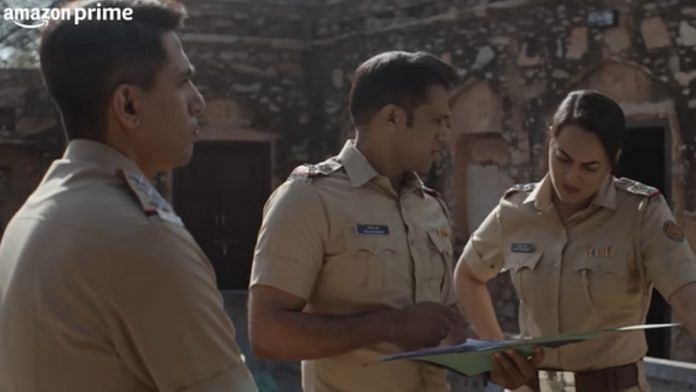Dahaad, an eight-part Amazon Prime series directed by Reema Kagti and Ruchika Oberoi is a slow burn. It treats religion and caste as its real villain.
A bunch of women from the small town of Mandawa have been found dead in public toilets. They all belong to lower caste communities and they all had eloped from their homes. Police station chief Devi (Gulshan Devaiah) and his officers Anjali (Sonakshi Sinha) and Kailash Parghi (Sohum Shah) have been tasked with finding these women. Love jihad is connected to the case.
The obvious suspect in the eyes of the police is a mild-mannered Hindi professor, Anand, played by Vijay Varma. How the investigation unfolds forms the crux of the series.
Star of a screenplay
In the world of recent police dramas, such as Netflix’s Khakee: The Bihar Chapter (2023), Dahaad stands out for both its characters and writing. It takes the ingredients of the quintessential American serial killer drama and places them in Mandawa, Rajasthan. The show is compelling and often uncomfortable because of Kagti, Zoya Akhtar and Ritesh Shah’s screenplay.
Rajasthan is as much as character in the show as the people. The writing is very rooted in the place and looks at the way people greet each other to its belief system, and feels like no other place could have been a better setting.
The serial killer is the product of the system of oppression. He also knows how to masterfully manipulate it. The caste system and the rampant violence against women in the form of honour killings intersperse with the non-glamorous grind of police work. Family responsibilities and the humane side of law enforcement find their way into the show.
The show is a glimpse into the world we live in. It’s about changing patriarchal practices and cleansing the society of a man like Anand. It’s also about doing one’s job well.
Despite the lack of a big twist, it is gripping in the way it picks up details—from the way a constable lights an agarbatti (incense stick) every time his ‘lower-caste’ senior walks by, to the growing popularity of chat rooms in small towns. Almost everyone asks Anjali, “Are you married?” even as she is investigating multiple murders.
Also read: Queen Charlotte is better than Bridgerton. It’s about monarchy, race and mental health
Elevated by performances
The high point of Dahaad is its impeccable cast. Sonakshi Sinha as the bullet-riding woman cop in Mandawa is a treat. On one hand, she is called hunterwali, and on the other hand, she’s eve-teased on the streets. It does not deter her from doing her job. As she explains to another character, women of her caste don’t have much choice. Sinha portrays the character without being unnecessarily aggressive. She speaks facts and cares about getting the job done—a refreshing take on a woman in a leadership role.
One would hardly suspect Varma’s Anand to be a misogynist or worse a serial killer. He drives around in a van full of books and reads out stories to disadvantaged village kids. He lives with his wife Vandana (Zoa Morani) and a son. Anand is the ‘nice guy’ who never loses it. Varma exudes Amol Palekar-like charm as he lures women for sex before killing them.
It is definitely a contest between Varma and Devaiah when it comes to stand-out performances in the show. The honest SHO Devi Singh is capable, encouraging and sensitive. He looks out for both his officers and the people who are disadvantaged in the socio-political space of Mandawa. He is terrific as the now common ‘men-written-by-women’ character. In a world of hyper masculine men constantly flexing power, he is quiet, efficient and sensitive.
From the Marwari accent to his body language and mannerisms, he is very believable as a small-town cop, probably the best in the show. Even in moments of imparting knowledge, he does not come across as preachy but empathetic.
Sohum Shah’s acting skills have always been on-point, from Tumbbad (2018) to Maharani (2021). In Dahaad too, he plays his part with no hiccups, as the policeman who is corrupt, but also takes his work seriously. Ultimately, he is also disillusioned by the world he sees around him and that’s why he tries to dissuade his wife from having a child. His range of emotions is to look out for, as he makes you root for him with his character arc. From a ‘yes sir’ corrupt cop, annoyed by his female colleague’s rise, he becomes the man horrified at the crimes he is assigned to solve.
His emotional dilemma stems from not wanting to bring a child into the messy world he encounters every day, and his wife being hurt by his suggestion of an abortion.
The show is let down by its ending, which does not quite justify the build-up to the moment. Dahaad is no Delhi Crime (2021) but is definitely a powerful portrait of the small-town psyche and prejudices.



